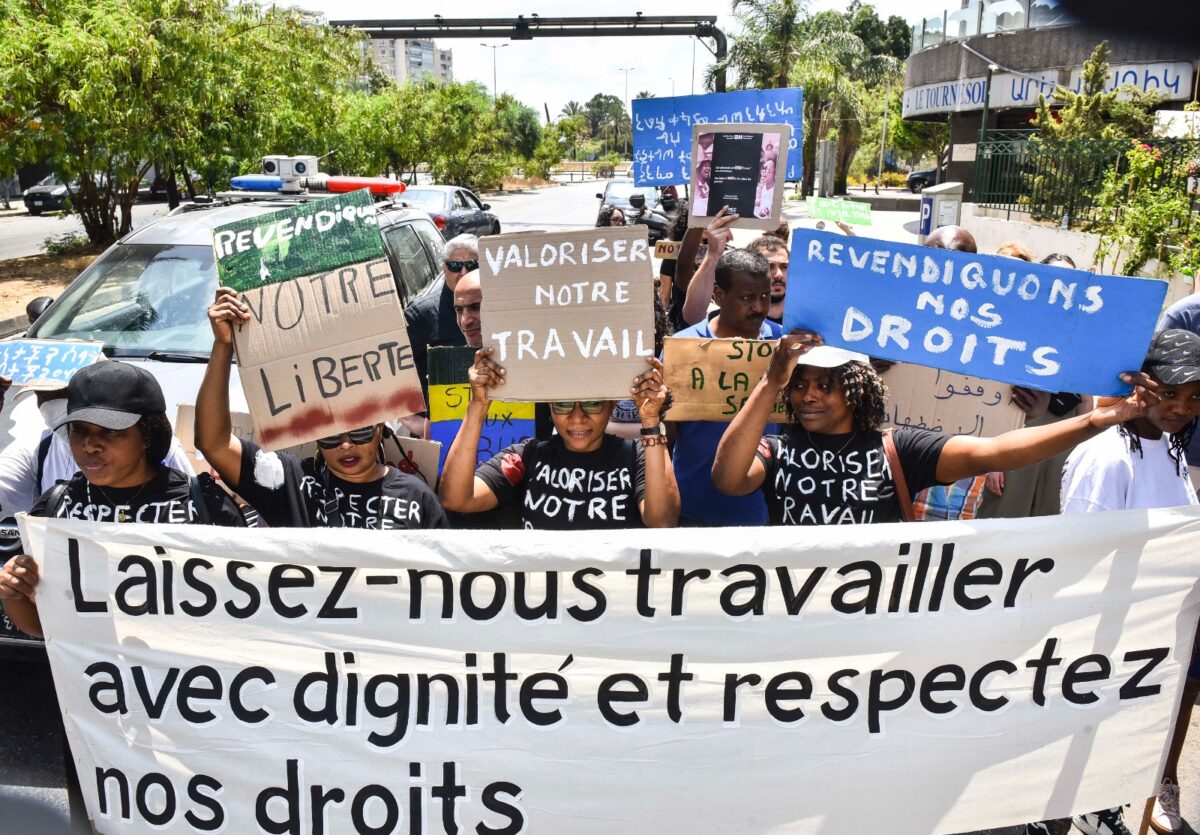
Amid war, migrant domestic workers in Lebanon face abandonment and homelessness
As the Israeli military’s bombing campaign has intensified across Lebanon, thousands of migrant domestic workers are believed to have been abandoned by their employers who have fled their homes to save themselves. Many have been stranded without essential belongings, including passports, identification documents, or even a phone to reach out to fellow community members, with access to transportation to escape war zones being very limited.
According to the UN Refugee Agency (UNHCR), over 1.2 million people, approximately one-fifth of Lebanon’s population have been displaced due to strikes and ongoing clashes between the Israeli Army and Hezbollah.
Among those affected are likely many of Lebanon’s estimated 177,000 migrant workers, the majority of whom are employed under the kafala or sponsorship system. This system, common in Lebanon, Jordan, and several Gulf countries, binds workers to a single employer, stripping them of basic rights and autonomy. Employers typically confiscate workers’ passports, and although workers can be dismissed, they cannot choose to resign.
Government-run shelters are currently open exclusively to displaced Lebanese citizens, leaving out non-Lebanese communities, including migrant domestic workers. Activists and NGOs are urging the Lebanese government and international organisations to incorporate migrant workers into their crisis response plans.
Dara Foi’Elle, Policy and Communication Manager at Migrant Workers’ Action, has been actively working on the ground due to the intensity of the crisis and the vast number of displaced individuals.
“We’re witnessing a large number of migrant workers being abandoned by their employers, with some unable to access their personal belongings, including passports,” Dara said.
In many instances, employers have already left Lebanon or moved to safer areas within the country to stay with relatives, while some have relocated to emergency shelters that do not admit non-Lebanese individuals, according to Dara.
With no possessions and no money, many of the women cannot afford data SIM cards to call home.
Almaz, a migrant domestic worker from Ethiopia who is staying with her friend in Aley told NOW that her employers in Nabatieh left the house as the bombing started and told her to “stay and look after the house and wait for someone to come and collect you.”
“I didn’t have a phone, money, or my passport, they kept all of that locked away. I had no idea what to do.” Almaz recounted.
“Some neighbours were leaving in a van, and they let me come with them. We travelled to Beirut, but I didn’t know anyone there,” she added.
For four nights, she slept on the street with nothing to eat and no way to stay clean. According to Almaz, other women were sleeping there too and watched out for each other amid the danger, especially at night with many men and strangers walking around.
In 2021, UN Women reported that 76 per cent of all migrant workers and 99 percent of migrant domestic workers in Lebanon were women.
Since the intensification of the attacks, these women have endured harsh conditions, forced to sleep on the streets where they face various forms of violence, including sexual violence. “Without access to toilets, they’re left to use small, secluded corners,” Dara explained. “You can imagine the heightened risks with men looking around and the severe lack of hygiene.”
The vulnerability of these migrant workers is exacerbated by legal and economic barriers, making it crucial to prioritise their protection. In the current circumstances, vulnerable communities such as undocumented migrant workers are at an increased risk of exploitation and trafficking, according to sources from support organisations.
The kafala system significantly traps workers in abusive situations, with employers exerting control over essential documents like passports and exit visas. Without these documents, workers are unable to leave the country or seek help.
Several domestic workers shared their experiences on media and online interviews, stating that when the conflict in Lebanon intensified, they found themselves without a passport, money, or any means of escape. Their employers abandoned them, leaving them without access to legal or humanitarian assistance.
Community efforts to provide relief
DoWAN, a Sierra Leonean community group that works along with ARM (Anti-Racism Movement) Lebanon to coordinate help for the workers from the Sierra Leonean community. The community leader recently found shelter for 30 women where we helped arrange transportation for them.
Similarly, TresMarias is the community of workers from the Philippines that also raises awareness about the current situation of displacement of women from their communities and are working together in community kitchens to cook food and provide it to the displaced migrant workers, whilst facilitating the distribution of essential hygiene products in collaboration with NGOs like Jeyetna who fight period poverty in Lebanon.
Activists urge migrant workers’ respective embassies and consulates to expedite the repatriation process for those wishing to return home and provide both financial as well as administrative support to migrant workers and their families reaching out for assistance to travel.
Challenges
Many migrant workers, already earning meagre wages, often as low as 150 USD per month before the economic crisis, are no longer receiving salaries at all.
In the first few days when thousands of people started fleeing their homes, the government was nearly absent in its response. Currently, they are making more efforts to assist displaced individuals, but these initiatives still exclude non-Lebanese, according to Kareem, an activist with ARM Lebanon. The primary burden has fallen on NGOs and local volunteer initiatives to support this vulnerable group.
According to volunteers on the ground, while these grassroots efforts are essential, they cannot fully meet the needs of displaced migrant workers without coordinated international support and formal legal protections.
The lack of a comprehensive protection framework from the international community, coupled with Lebanon’s inaction, leaves migrant workers highly vulnerable, dependent solely on these strained support networks.
Rodayna Raydan is a Lebanese-British journalist. You can follow her on Twitter @Rodayna_462
The views in this story reflect those of the author alone and do not necessarily reflect the beliefs of NOW.








